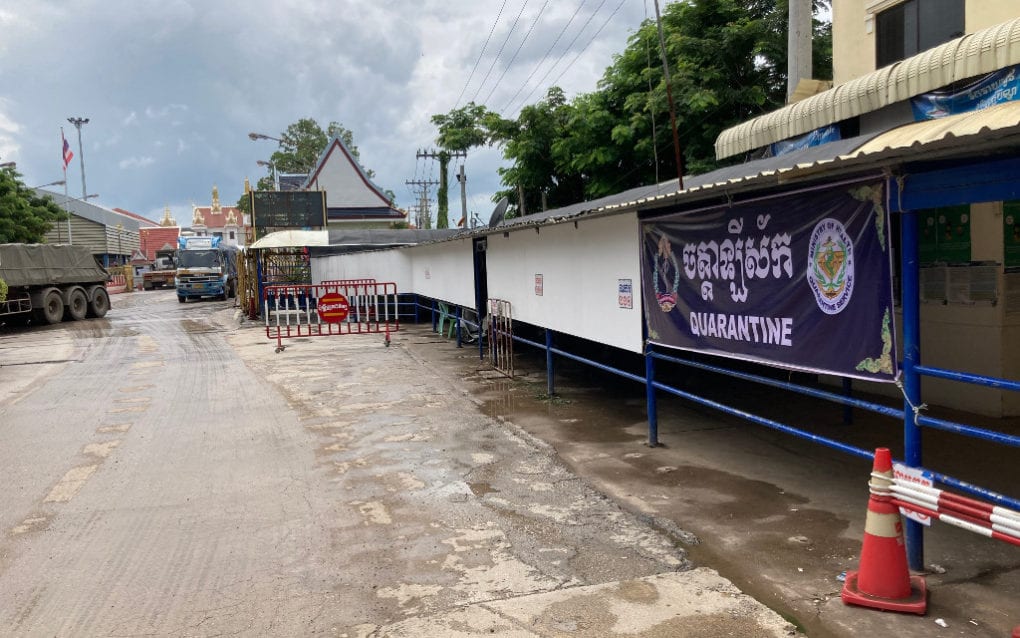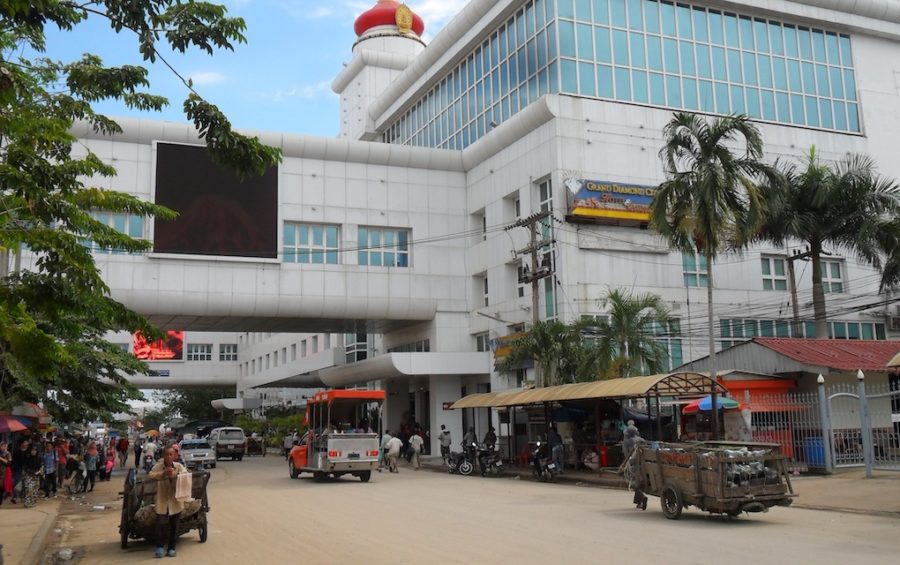Sin Reaksa, a staff member at DNA Star Vegas Casino in Poipet, says he and 40 colleagues occasionally get 10 minutes to leave their seven-story dormitory, cross the road, and quickly buy groceries or food from vendors rolling past with carts.
Otherwise, the 20-year-old is stuck behind barricades and guards in the midst of the border city’s casino-centered Covid-19 outbreak.
He says no one has yet tested positive at this casino, but the industry is locked down. Banteay Meanchey province has seen hundreds of Covid-19 cases since April 26, when it reported 92 new cases, up from zero on the previous day.
Casino staff say workers in the sector get little support or protection, and amid the lockdown living is getting tough.
Poipet, with a population of around 100,000, has a cluster of casinos centered around Cambodia’s main border crossing to Thailand. Reaksa’s Star Vegas claims to be the “largest, most luxurious, and most successful” venue there.
The 20-year-old works and is under lockdown at the casino resort with his wife, but their infant girl is with Reaksa’s mother outside. So aside from finding food for themselves, the couple needs to make sure there is enough money to buy milk for his baby.
“I’m concerned about food and milk for my child, because I have no income, I have no job and my child is just 2 months old,” he says.
For himself, meals are usually canned fish, duck eggs and instant noodles, though he sometimes also gets fried pork. He buys them with savings from his last salary. The money will likely last only another week, he says.
He has no hope that his employer will provide any money or allowance while business is suspended, as last year the venue was closed for six months and he received nothing.
“The way I think about it, I won’t worry. I know they won’t give anything because we aren’t working.”

So Samrithsila, a 39-year-old stock manager at nearby Grand Diamond City casino, says he lives in a block of rental apartments that has seen many Covid-19 cases. Police officers guard every entrance, preventing people from leaving even to buy food, he says.
“Some days we [only] have bowls of rice. We’re saving. We are strict and save,” the manager says. Samrithsila hopes businesses will reopen on Saturday, two weeks after the outbreak began.
“There are three days left. If they continue the lockdown for another half a month, then we will really struggle, which means we will be starving.”
Living has been hard since last year, he adds. Since the emergence of the global pandemic, the casino has split employees’ shifts so he only works a quarter of every month.
He has looked for work as a motorbike taxi driver and other part-time jobs to earn money, and his family has sold valuables — jewelry, a motorbike and plots of land, he says.
Yong Yin, a card dealer at Great Lion casino, says he got out to stay with his family of five just a day before the lockdown.
The 39-year-old, who has two small children, says he and about 70 other employees haven’t received any money or food support from the company during the closure, explaining that the casino sector isn’t like the highly unionized manufacturing industry.
“The casino sector is hard — unable to get allowances. [It’s] different from other sectors like the garment sector,” Yin says, adding that he is worried about making debt repayments.
A human resource officer at Sand Palace Casino, Van Chamroeun, says the casino’s approximately 30 workers are locked down in the building, but they receive three meals a day from the company and free accommodation, though they do not receive any money while business is suspended.
“We are very worried too, because if the disease continues spreading more seriously, our staff won’t have jobs any longer because we can’t run our casino business,” Chamroeun says.
‘They Become Rich’
The Banteay Meanchey provincial administration announced a two-week suspension of all casinos across the city on May 1 as it designated areas as locked-down red zones until at least May 8.
As of Tuesday, there were more than 500 active Covid-19 cases in the province, according to Health Ministry data compiled by VOD. The ministry has stopped issuing provincial-level data as of Wednesday.
Bun Sothy, provincial coordinator at the Collective Union of Movement of Workers, says casino workers in Poipet are facing unemployment, rising debt and lack of money to support their daily lives.
There are about 20,000 workers in the industry there, employed at nearly 50 casinos, according to Sothy.
He says workers in the sector shouldn’t be overlooked, and their bosses should be helping them.
“They become rich, become a millionaire,” Sothy says. “It is because of the staff.”
“So I only suggest that they should be kind by taking care of the workers whom they used to help them get rich. Take care of their living, health and provide an allowance too.”
Poipet governor Keat Hul said on Wednesday he was too busy providing food to people to comment. Labor Ministry spokesperson Heng Sour has not responded to questions.
Factories in the City
For workers elsewhere in the city, the outbreak around the casinos has become a cause for concern.
Sok Vathana, a worker at the ML Intimate Apparel factory in the O’Neang Special Economic Zone, says his employer has asked all 660 staff members to move into on-site accommodations to avoid contact with the outbreak.
“It’s because we can’t see the problem — we don’t know who has been infected and who has not. Everyone must be careful,” he says.
Sat Vuthy, a union leader at Hi-Tech Apparel in the same industrial zone, says they are about 3 km from the lockdown area. But there have been fears that some workers living in red zones have come back to work, he says.
The factory, which produces clothing for Nike, has more than 4,000 workers, he says. Many want production halted for two weeks, Vuthy adds.
Chhoam Pin, 39, a worker there, says he doesn’t want to risk taking the virus home to his three children.
“We are really afraid. We don’t know what to do as we work together on the same production line,” he says. “If we get infected, we will feel sorry for our children at home.”












